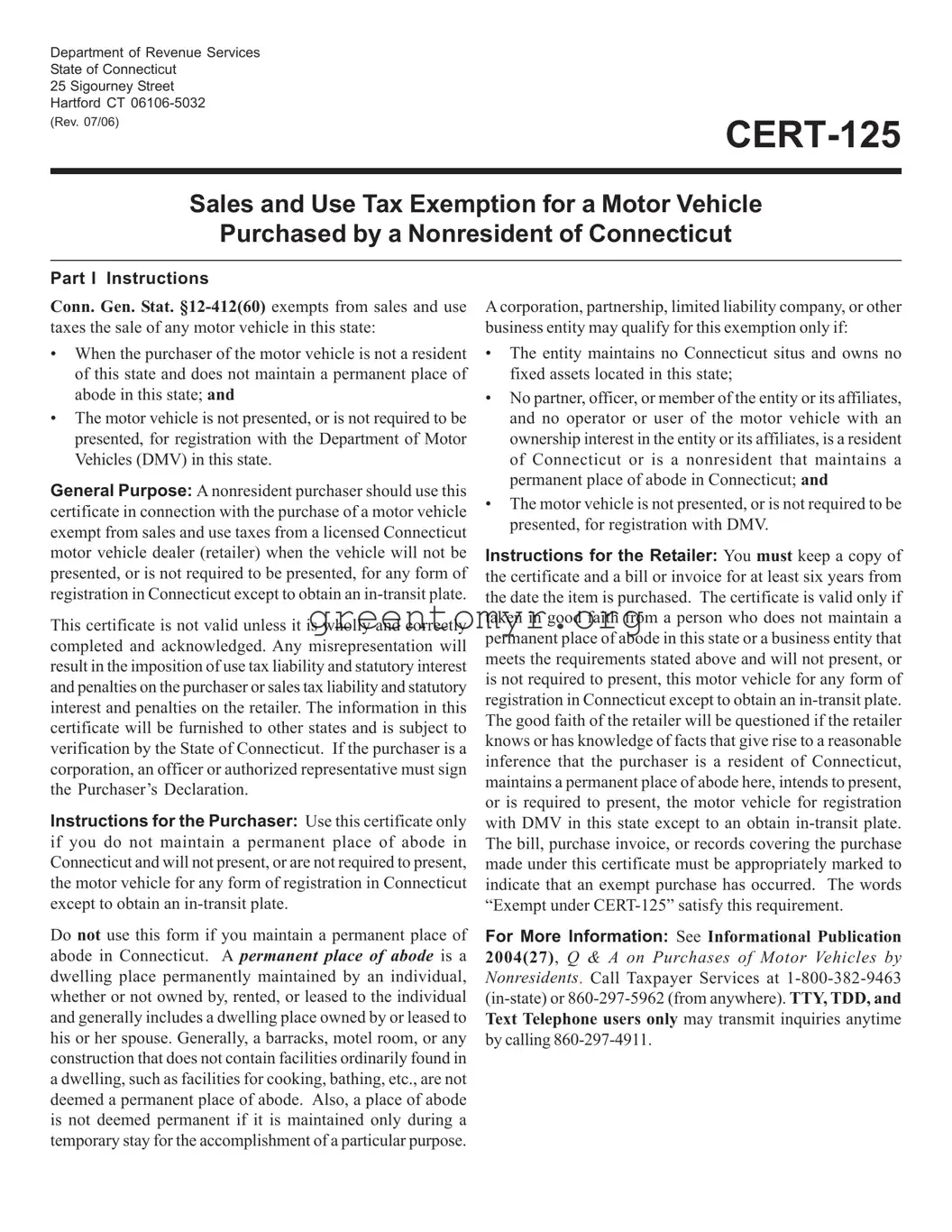Part II Retailer and Purchaser - Read instructions first, then complete Parts II, III, IV, and V.
Retailer Information
Name of retailer _____________________________________________________________________ |
CT Tax Registration No. _____________________ |
Street address _______________________________________________________________________ |
Date of sale ________________________________ |
City or town, State, ZIP Code __________________________________________________________ |
Telephone No. _____________________________ |
Purchaser Information
Name of Purchaser ________________________________________________ |
Daytime Telephone No. _________________________________________ |
If an individual: |
|
|
|
|
|
|
If corporation, partnership, limited liability company, or other business entity: |
Home address |
___________________________________________________ |
Business address |
_______________________________________________ |
|
___________________________________________________ |
|
|
_______________________________________________ |
Name and address ________________________________________________ |
Name and address ______________________________________________ |
of employer |
________________________________________________ |
of partners, |
______________________________________________ |
|
|
|
|
|
|
|
officers, |
|
|
|
|
|
|
________________________________________________ |
members, and |
______________________________________________ |
|
________________________________________________ |
operator(s) of |
______________________________________________ |
|
|
|
|
|
|
|
motor vehicle |
|
|
|
|
|
|
|
|
|
|
|
|
|
|
|
|
|
Driver’s License Number |
|
State |
|
Expiration Date |
|
Driver’s License Number |
|
State |
|
Expiration Date |
(Attach copy of each out-of-state driver’s license. Use additional sheets if necessary for the names, addresses, and license numbers of additional drivers.)
Part III Motor Vehicle Identification Data
Year _________________ Model __________________ Make of vehicle _____________________________________ Color ______________
Vehicle identification number ___________________________________ State of registration and number __________________________________
Computation of Price |
Trade-in Data |
Gross sales price* ____________________________ |
Year ________________ Make ___________________ Model __________________ |
Trade-in allowance ___________________________ |
State of registration and plate number _________________________________________ |
Net sales price ______________________________ |
Vehicle identification number ________________________________________________ |
* Do not deduct manufacturer’s rebates from the gross sales price.
Part IV Purchaser’s Declaration
Please initial:
_______ I, the purchaser, or person authorized to sign on behalf of the purchaser named in Part II, acknowledge that the retailer has explained to me the
meaning of a permanent place of abode as defined in Part I (or the requirements for business entities as described in Part I) and I declare that I do not maintain such a permanent place of abode in Connecticut.
I, the purchaser, or person authorized to sign on behalf of the purchaser named in Part II, declare that I purchased the motor vehicle described in Part III from the retailer named in Part II. The purchaser is not a Connecticut resident and does not maintain a permanent place of abode in Connecticut, or the business entity meets the requirements described in Part I. The purchaser is a resident of (or the business entity is located in) the State of __________________ . This motor
vehicle will not be presented, or is not required to be presented, for registration with the Connecticut DMV. I declare under the penalty of false statement that I have examined this certificate and to the best of my knowledge and belief it is true, complete, and correct. I understand the penalty for wilfully delivering a false return or document to the Department of Revenue Services (DRS) is a fine of not more than $5,000, or imprisonment for not more than five years, or both.
Signature of purchaser
or authorized person ________________________________________________ Date ________________________________________________________
If corporation, partnership, limited liability company, or other business entity:
Print name of purchaser
or authorized person ________________________________________________ Title _____________________________________ Date ___________
If jointly purchased,
signature of other purchaser __________________________________________ Print name of other purchaser ___________________________________
Part V |
Retailer’s Declaration |
Please initial: |
_______ |
I, an authorized agent of the retailer named in Part II, declare that I have explained to the purchaser that owning, leasing or otherwise maintaining |
|
a permanent place of abode in Connecticut, even if it is not permanently occupied by the purchaser, subjects this purchase to Connecticut sales tax |
|
and prohibits the use of this certificate. If the purchaser is a business entity, I have explained the exemption requirements for business entities set forth |
|
in Part I, or if pertinent, I have explained the requirement for business entities to use this certificate as described in Part I. |
I, an authorized agent of the retailer named in Part II, declare under the penalty of false statement that I have examined this certificate and to the best of my knowledge and belief it is true, complete, and correct. I understand the penalty for wilfully delivering a false return or document to DRS is a fine of not more than $5,000, or imprisonment for not more than five years, or both.
Print name of retailer’s authorized agent _________________________________________________________ Date _______________________________
Signature of retailer’s authorized agent ___________________________________________________________ Title _______________________________


